
One of the other parents in our school district wrote an editorial in our local paper, and I thought I'd comment here, maybe a first draft of a response.
First, I'd like to be clear that I have mixed feelings about the author of the editorial, and I do know her son, but have not seen him in over a year. My feelings are mixed because I have great admiration for her ability and energy to fight for her son. However, this is a case where this lady got what she wanted at everyone else's expense; her battle casualities included the best preschool teaher I have met, and being on the preschool circuit for three years, I met quite a few- and certainly this lady was the best teacher we had in that preschool. On top of that, clearly we disagree about how to deal with autism. She has a clear agenda for what to do; I, as usual, believe in individualization.
I'll start at the beginning.. the scenario of devastation as the screening comes back "on the spectrum." I am all about fighting this right here. I understand the feeling of devastation. I also know the root of that pain is ignorance. When a child is diagnosed autistic, arents are caught unprepared. It may be the first time they had ever heard the word "autism." They know nothing about it. Until you are in the world of special ed, you have no idea what it is, or who is in it. Our culture values the "beautiful people", and anyone not fitting this mainstream idea of "normal" is cast aside one way or another. Your child is diagnosed with autism, and all you know is you have a long road ahead of you, and have no idea where that road is going.
I started this blog to chip away from the panic. I think the editorial was Gleibys' way of trying to chip away at the panic. There should not be any reason to panic. At least for once, we have the same goal in mind. Get past fear by making it something not completely unknown.
And the next step is, I believe worthy. You are doctor just informing a parent that Little Johnny is autistic. When this happened for us, the doctor gave us a book that we discovered was well out of date, the phone number for his nurse, and advice to call the school. Needless to say, this was woefully inadequate.
So here is my Quick Guide for Parents for the Day After Diagnosis:
(The Day Of Diagnosis, just go home and enjoy your child. Maybe put a fresh pot of coffee on, or take up drinking coffee.)
1. Here are the people to call:
Local Autism clinic, if you didn't get get the diagnosis there. Here, that would both Kluge Children's Rehab and Kennedy Krieger. Some centers, like Kennedy Krieger, take a year to get an appointment for anything. Kluge takes a couple of months. A year is a little long, but a couple of months is OK. This is urgent, but not an emergency. Besides, you have other folks to call and get going.
The local school district. Many of teh supports your child needs are the responsibility of your local school district. You want to get a feel for the place, have an eval, get into the system- even if you decide to homeschool.
Your insurance. KNow what they will cover, and what they will not. Many insurances will cover OT without batting an eye, but will not cover speech therapy because it is "educational." Some insurance see "autism" and cover NOTHING. Some see it and cover EVERYTHING. Some therapies are considered educational and not medical- and this can be different from insurance to insurance, state to state. You may choose interventions that are not covered, and you need to know what you will be paying for, how much it will be, and what you will need to do to cover it.
The speech pathologist. Some centers have them, some local hospitals have them, and there are lots of private practice ones. Be sure they are going to work on communication, not just speech. Do they do sign language, switches, PECS? How do they use these as tools for communication, and not just learning to speak? How do they use them to encourage- but not force- speech? Do they also work with reading and other visual communication?
The physical therapist. Many autistic kids have gross motor problems that need to be addressed. Many don't need a PT (Joey doesn't need a PT).
The occupational therapist. Ask specifically about sensory integration therapies. Most autistic kids have some form of SPD (though not all!). You don't want just a buttons and zippers OT, you want one that will take an integrated approach and can address the needs of your child.
Your pediatrician. Be sure they are immediately aware. Ask questions. What will they do for you? What do they know abotu autism? Are they willing to do some research or attend a conference or workshop about autism? If you have a doctor who seems ignorant of autism- and many are- and is unwiling to beome educated, then you will be needing a new ped.
Psychologist. You may need some testing done in ways the school doesn't accomodate, some understanding of your child's mental health, and yes, you may need medications. Be prepared.
Your local Disability Resource Center. These types of organizations can help you navigate local resources, prepare for things like Medicaid Waivers, even help you understand disability law and rights. They can also help you network with other parents of disabled children.
State agencies for the disabled. Many states have offices specifically geared to helping people with disabilities and protect their rights. Its a good idea to be familiar with these offices and what they actually do in your state or locality.
A Lawyer. You're about to become an expert in disability law. School districts and insurance agencies can be not fun to work with. Be prepared. Find a lawyer and advocate who deal in disability and educational law. BE prepared in case you run into problems- its a lot easier to prepare for a fight if you already have your champion lined up, rather than waiting until you have a problem. I haven't met a parent yet who didn't have a problem.
I know that is a lot of phone calls. Prepare ahead of time- get a big loose-leaf notebook to keep paperwork, evaluations, even phone messages in. Just keep it by date; when you make a call, note it on a sheet with the date and a summary of what was discussed, and put it in the notebook. When the evals come, just put them in the notebook. Bills. Letters. IEPs. Anything. I even have Joey's birth certificate at the front. I'm on our second 3" binder.
2. Here are things you need to do:
Relax. Your child hasn't changed. You just have a new label to point you to resources you might need.
Read. The books I recommend are: From Emotions to Advocacy by Pete Wright.
1001 Great Ideas For Teaching and Raising Children with Autism by Zysk and Notbohm.
That will give you a start. I encourage folks to include their favorite resources in the comments.
Read some more. You will need to research different methods and strategies used with autistic children. Some I can think off the top of my head are ABA (Applied Behavioral Analysis), PECS (Picture Exchange Communication System), Floor Time, Sensory Integration, Therapeutic Listening, GFCF (Gluten free/Casein free diets) {and other possible allergies and diets- if your kid has sensory issues, allergies can drive them crazy!], ABLLS (Asessment of Basic Language and Learning Skills), TEACCH (Treatment and Education of Autistic and related Communication-disabled[or handicapped] Children).
Get online. Check out the links I have in the sidebar. I've developed a handout for new parents here in Virginia, I'll be happy to email it to you. Also, you can network with more great folks like us. :)
Go out and have some fun! Remember, your child hasn't changed! Go out and do the stuff your child likes to do! Try to introduce your child to new experiences- as you would any child! These outings may take more preparation(and work) than for non-autistic families, but it's worth it. Keeping kids locked in the house will drive you crazy, too, and deny them living. Yes, some folks will stare. You may get unkind comments, or offensive comments. But you know what? You would have gotten them even if you didn't know about autism. Now you know how to support your child in the face of these people- "My kid's doing a great job with this new experience. What's your problem?"
Summary? You now know your child is autistic. Now you have a better plan for moving ahead and educating your child- which now makes your life better, not worse. Yes, now that you know the kinds of resources you need, you now have work to do to tap those resources- but now you have narrowed the field to the resources you may need!
See? Not scary. Just needs a little information!.




















1 comment:
That's a great checklist, Joey's Mom. I wish I had read something like that when my son first got diagnosed...
On the other hand, I can find some positive aspects about Gleiby's article. It is not meant to be reassuring, or really aimed at parents. It's more like lobbying for the school districts to provide intense ABA. In a way, I think she is right to advocate for more resources that are specific to autism in schools. And her main message is that autistic kids can learn and improve if the appropriate education is provided. It might not be ABA - but we certainly need strong, intensive one-on-one attention in order to make autistic kids thrive.
I understand that her requests might have had a negative impact in your school or that you were against the "one size fits all" approach that she had. However, the main problem is not the parent who is fighting for her child's rights under IDEA, but the school district that does not have enough funding to provide choices for adequate education of autistic children - individualized or not.
Post a Comment